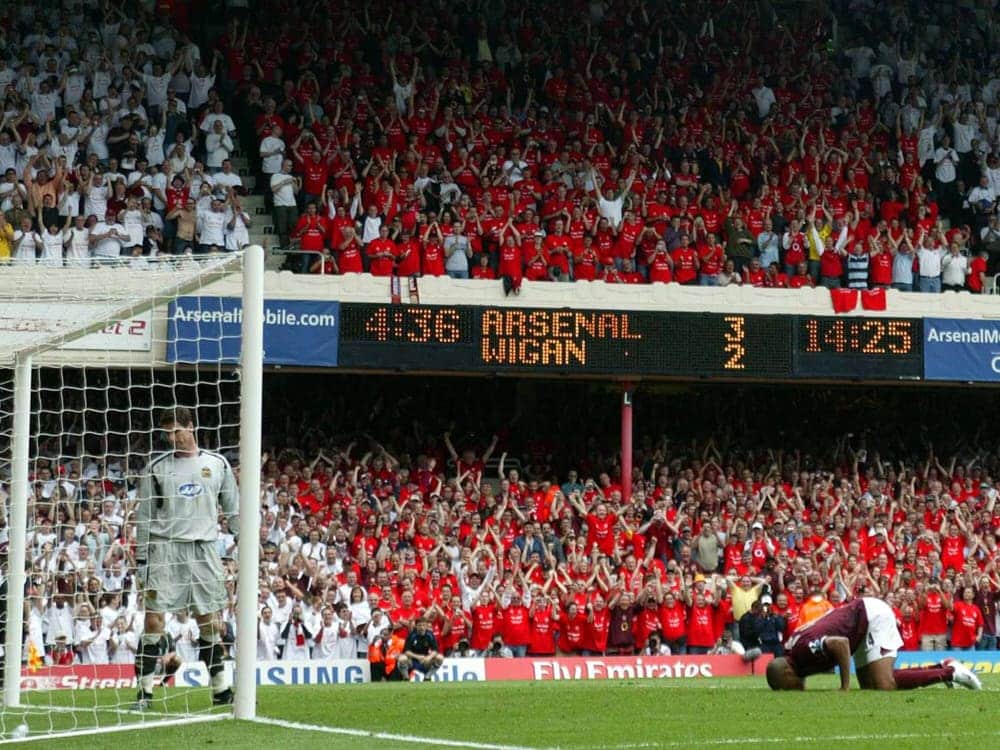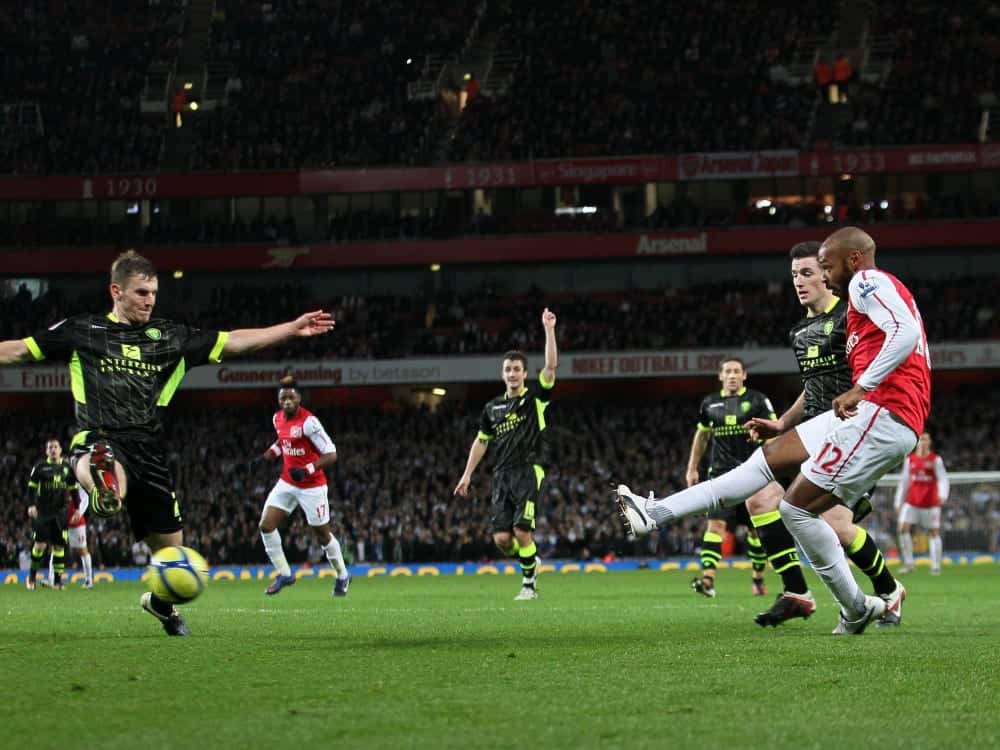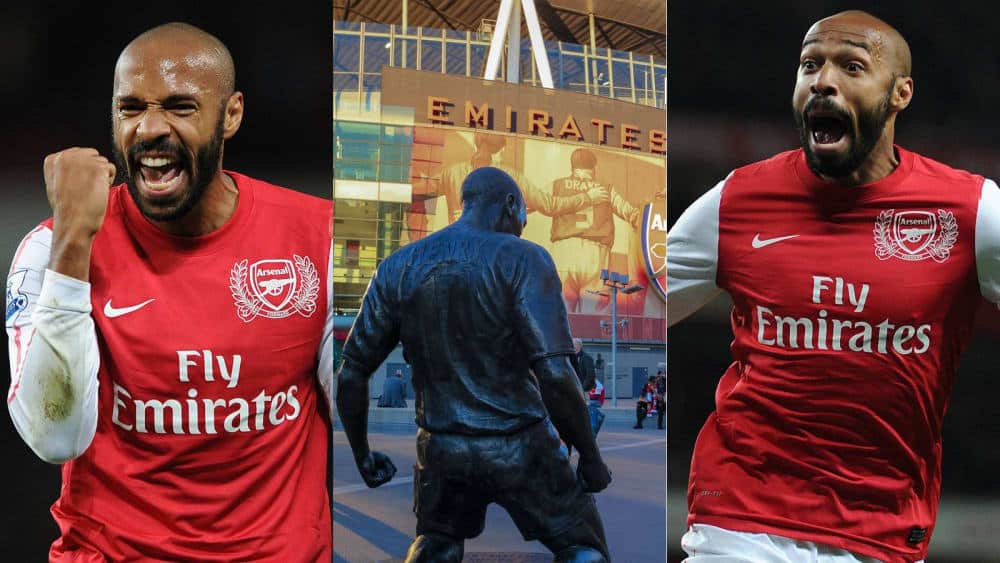In January 2012, an ageing Thierry Henry was supposed to be just helping out at Arsenal. Instead, he created a moment for the ages
It only takes an eleven minute walk to travel back to the good old days.
In January 2022, Arsenal FC under Mikel Arteta may seem to be on an auspicious path, but is it really more auspicious than the one back to Highbury yet?
Where today stands an ultra-modern housing estate that has devoutly retained the look of a stadium, half an eternity ago the Gunners were playing quarter-finals and semi-finals in the Champions League; winning a golden championship the likes of which no Klopp, no Pep, no Ferguson managed.
Henry seduced the fans
Highbury today stands mainly for the Wenger era, but that also existed in the mid-90s and still until 2018. Rather, it was the Thierry Henry era that won Arsenal admirers and fans around the world. The Frenchman even had blood on his hands, one such fan recently complained on Twitter – because Henry had once seduced him into becoming a Gooner. Which hasn’t been as fun as it once was for a long time.
The Henry era is long gone, and was ten years ago. It ended pretty much at the same time as the Highbury era. At the spot where Henry King had managed the first “hat trick” in 1914, “King” Henry scored the last one in 2006. Past and present are sometimes pretty close together.

A year after Arsenal moved to the Emirates Stadium, Henry bid farewell to Barcelona, where he fulfilled his dream of winning the Champions League. Dreary times were dawning for the Gunners.
They had failed to win another title, losing Cesc Fabregas, Samir Nasri and 8-2 to a B team Manchester United side, when proud north Londoners were starved of good news in January 2012.
Incredibly, but true, they were not to be disappointed.
Arsenal had lost their first game of the new year and were about to be forced to drop two attackers, Gervinho and Marouane Chamakh, for the Africa Cup when a supposed snap idea suddenly matured into a serious consideration.
None other than Henry, who had moved to the MLS at the age of 34 to round off his career and had just come back from holiday, was to solve the Gunners’ personnel shortage. Even if it was only for two months. The spectacular loan deal went through. Arsenal had its good news.
“I’m only coming to help,” the living legend appeased, four and a half years after his departure. Henry was at pains not to make any promises he could not keep afterwards. The fans did not care.
But it happened at the time that the Gunners, still coached by Wenger, were playing a second division team in the third round of the FA Cup on an uncomfortable Monday evening. A yawningly dull affair as underdogs Leeds didn’t exactly seek their salvation on the offensive and the favourites also put in a fairly uninspired performance.
For an hour Wenger watched the tragedy unfold.
Then he made use of something that was bursting with inspiration: he substituted a new striker. But not just any striker. But not just any striker, but Arsenal’s record goalscorer, to whom they had erected a statue in front of the Emirates only weeks before. And suddenly he was back on the pitch. The return of the King, frenetically cheered.
The Thierry Henry finish
It was no longer Highbury, to be sure; nor was it the back number 14 occupied by Theo Walcott, but the 12 Henry had originally wanted but which had not been available in 1999. And it was no longer that exceptional figure who sprinted as elegantly as Carl Lewis and moved across the turf as smoothly as Muhammad Ali. Who could outrun five opponents without even having to breathe heavily, as Paul Scholes once noted in disbelief.
Henry looked lumbering, stiff, he just looked older. For four touches on the ball.
He was on the pitch for nine minutes, there wasn’t much time left to play, it was still 0-0. And nothing worked. Time to change the clock. Set off on the half-left, open stance, one contact, turning up inside, low shot into the far corner. The typical Thierry Henry finish. Actually too cheesy to be true. “Actually I thought the angle was too acute,” Wenger admitted.

Not for Thierry Henry, who usually jogged off nonchalantly after scoring, but this time – “It was the first time I scored as a fan” – he went on an almost uncontrolled jubilant run. He ended up in the arms of Arsene Wenger, who witnessed “a story that will be told to your children”. Even if it was only a third round match against a second division team and Arsenal ended up without a title again.
“He may be cast in bronze, but he’s still capable of producing truly golden moments,” the voice of ESPN commentator Jon Champion gushed. With this one moment, which was almost insignificant in sporting terms, Henry had once again allowed “his” beleaguered Arsenal to reminisce in the flesh about the golden days. Although he was already cast in bronze just a few metres away.
The past and the present are sometimes quite close together.





